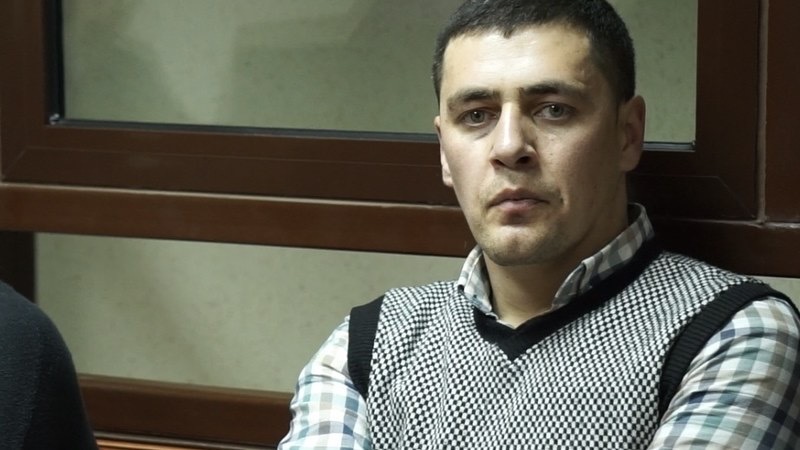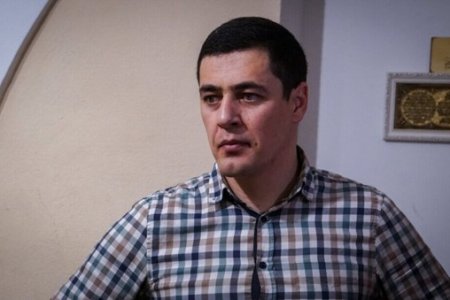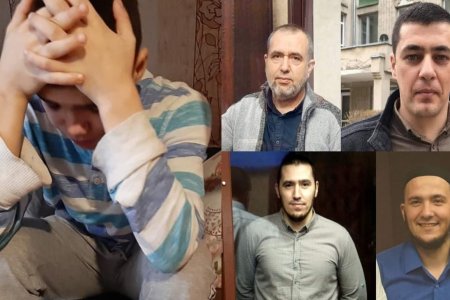
A week after it took over the presidency of the United Nations Security Council, Russia has flouted the express order of the UN’s Committee against Torture and set about killing the second Crimean Tatar political prisoner in two months, after torturing Dzhemil Gafarov to death. Amet Suleimanov was taken into custody in the evening of 5 April 2023 despite a heart condition which, even according to Russian law, should preclude imprisonment. It is unlikely that he can survive the gruelling journey to a Russian prison colony, let alone imprisonment there, making this a death sentence without any crime.
Amet’s wife, Lilia Liumanova has told Crimean Solidarity that Russian penitentiary service officials turned up at their home on Wednesday evening and stated that the stamped document had arrived and that the 12-year sentence against her husband had now come into force. She had pleaded with the men to at least give Amet ten minutes to quickly eat something, since it is the Holy Month of Ramadan when all Muslims fast until sunset. They refused to allow even this smallest of concessions, and insisted he quickly gather his possessions. He had refused to allow the men into his home, and they forced him to get dressed in a room where the windows come out onto the courtyard and watched him, claiming this was to ensure that he did not try to escape. This cynicism is particularly offensive given that Suleimanov is one of only two Crimeans to date whose state of health meant that even the FSB did not demand his incarceration in the appalling conditions of an SIZO, or remand prison, but settled for house arrest.
Lilia Liumanova is not alone in considering this to be a death sentence against her husband whose state of health is incompatible with the conditions in Russian penal institutions.
Suleimanov suffers from chronic rheumatic heart disease, aortic insufficiency, coronary artery disease and third level mitral valve prolapse, and urgently needs a heart valve transplant. It was due to his serious health issues that he was forced to curtail the civic journalist work for the Crimean Solidarity human rights movement which almost certainly led to him becoming a target for FSB persecution in occupied Crimea. His wife notes that he also has lung and stomach problems, as well as joint issues, and has recently developed gonarthrosis, or progressive wear of the cartilage in the knee joint. The latter causes severe pain and restricts movement. The Russian occupation ‘authorities’ stripped Suleimanov of his invalid status in 2015 when he refused to have an operation in Moscow (although he had always received treatment in Kyiv). Such a lack of formal status changes nothing, and even the FSB who burst into Suleimanov’s home on 11 March 2020 understood that insistence that Suleimanov be held in a SIZO meant that he was likely to “die on their patch”, long before the predetermined sentences that have become a hallmark of Russian persecution in occupied Crimea.
It is clear that they no longer care, with Russia thus demonstrating contempt for the UN’s Human Rights Committee and Committee against Torture. As reported, the latter issued an interim decision on 22 February, in response to an application from Suleimanov’s lawyer Serhiy Zayets, asking that the Committee consider Russia’s treatment of Suleimanov under Article 22 of the Convention against Torture and Other Cruel, Inhuman or Degrading Treatment or Punishment. The Committee both registered the application, as No. 1175/2023, and applied interim measures. It called upon Russia to refrain from implementing this life-threatening prison sentence and asked that it ensure that Suleimanov received a comprehensive medical examination in a specialized medical facility and that he underwent heart surgery and/or treatment in accordance with the results of the examination.
Although Russia has declared, under the above-mentioned Article 22, “that it recognizes the competence of the Committee to receive and consider communications from or on behalf of individuals subject to its jurisdiction who claim to be victims of a violation”, it has chosen to openly flout the decision.
The Russian FSB came for Amet Suleimanov (b. 1984); the two sons of a renowned Crimean Tatar historian – Seitumer Seitumerov (1988) and Osman Seitumerov (b. 1992) and their maternal uncle Rustem Seitmemetov (b. 1973) on 11 March 2020. They had hoped to make five arrests that day, however the fifth man, a journalist (also called Seitumer Seitumerov) was already in mainland Ukraine, so they confined themselves to terrorizing his parents.
The charges against all of the men were eerily reminiscent of those used during Stalin’s Terror to execute the great-grandfather of Seitumer and Osman Seitumerov. Under Stalin, they claimed ‘counter-revolutionary terrorist propaganda’. In contemporary Russia, they use a deeply flawed Supreme Court ruling from 2003 to imprison men on ‘terrorism’ charges without even accusing them of a recognizable crime, let alone coming up with convincing evidence. The ruling declared the peaceful pan-Muslim Hizb ut-Tahrir organization, which is legal in Ukraine and not known to have committed acts of terror anywhere in the world, ‘terrorist’. Russia has been using this ruling, suspect ‘experts’ and so-called ‘secret witnesses’ since 2016 in occupied Crimea as a weapon of repression, especially against Crimean Tatar civic journalists and activists.
Seitumer Seitumerov was charged under the more serious Article 205.5 § 1 of Russia’s criminal code with ‘organizing a Hizb ut-Tahrir group’, while his brother, uncle and Suleimanov were charged with ‘involvement’ in this entirely unproven ‘group’, under Article 205.5 § 2. All of the men were also accused of ‘planning a violent uprising’ (Article 278) although even the FSB admitted that not one of them was suspected of actions or direct plans to commit any action aimed at ‘overthrowing the Russian constitutional order’
The three family members were immediately remanded in custody and remain imprisoned to this day. Suleimanov was held under house arrest, ‘attending’ the ‘trial’ via video link from occupied Crimea. The only ‘evidence’ to back the flawed charges were from religious literature which the men’s families all say was planted by the FSB who prevented lawyers from being present; from highly questionable ‘expert assessments’ of illicitly taped conversations in a mosque back in 2017, and two ‘secret witnesses’. The problem with the latter was not only that they appeared unable to distinguish one defendant from another, but that their identity was known, as was the considerable number of similar ‘trials’ where they had been used to convict defendants and get them sentenced to up to 19 years. Konstantin Tumarevich is a fugitive from justice in his native Latvia, and, without the appropriate papers, had every reason to cooperate with the FSB to avoid being deported. The same applies to Nazrulayev Salakhutdin (or Salakhuddin), who did not want to be forcibly returned to Uzbekistan. Russia is using such individuals to justify imprisoning men who have committed no crime for up to 20 years. This is despite a European Court of Human Rights judgement which found that Russia’s dependence on such testimony is a violation of the right to a fair trial and strong criticism from the UN Secretary General.
Despite such flawed charges and non-existent evidence, prosecutor Yevgeny Nadolinsky demanded horrific sentences against all four men, including 13 years in the case of Suleimanov (whom he had previously tried to get remanded in custody). On 29 October 2021, three ‘judges’ from the Southern District Military Court in Rostov (Russia) - Igor Kostin (presiding judge); Roman Plisko and Yevgeny Zviagin – largely obliged, sentencing Seitumer Seitumerov to 17 years; Osman Seitumerov to 14 years; Rustem Seitmemetov to 13 years and Amet Suleimanov to 12 years. All of these sentences are for the worst of Russian penal institutions, with the first 3.5 years to be spent in a prison, the most harsh of all.
Despite the clear inadequacy of the charges and of the purported evidence, as well as the death sentence against Suleimanov, the above sentences were upheld, on 9 February 2023, by ‘judge’ Aleksandr Aleksandrovich Mordovin from the Military Court of Appeal in Vlasikha (Moscow region).

